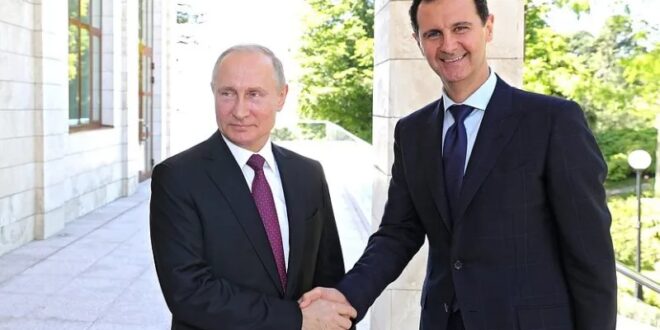Russia is stepping up its efforts to normalize ties between Syria and Turkiye in a bid to bolster its alliance with Damascus, which has proved exceptionally beneficial to both sides since President Vladimir Putin ordered a military incursion in 2015 that saved the regime of President Bashar Assad. Recent attempts by Moscow to set up a meeting between Assad and Turkish President Recep Tayyip Erdogan must be seen against the backdrop of an elusive victory in Ukraine, and heightened tensions between Moscow and the West.
In contrast to its miscalculated adventure in Ukraine, Russia’s intervention in Syria has been a resounding success. It now has permanent naval and air bases in the country, which have allowed it to extend its military and political influence across the Mediterranean into Libya and in the Red Sea as far as Sudan.
Assad has become increasingly dependent on Russia for survival, and during a meeting with Putin in Moscow last month, he said he would welcome any Russian proposals to set up new military bases and boost troop numbers in his country. Syria has supported Russia’s war in Ukraine, with Assad saying that Damascus recognizes the territories annexed by Russia.
However, the protracted military operation in Ukraine has taken a toll on Russia’s military resources, forcing it to relocate troops and munitions from Syria to the Russian-Ukrainian front lines. It needs to secure its gains in Syria and bolster a shaky alliance with Turkiye and Iran — two countries that have presence in Syria, but with conflicting agendas.
Erdogan, meanwhile, realizes that Assad’s regime has survived and that new geopolitical realities will make it harder for him to maintain support for anti-Assad rebel groups in Idlib while hosting millions of Syrian refugees in the provinces of southern Turkiye. This has forced him to adopt a more pragmatic approach toward Damascus.
Hosting Syrian refugees and Turkiye’s support for Syrian rebels have become hot issues in an election year. Erdogan’s popularity has suffered over his government’s handling of the earthquake disaster, while the opposition has vowed to pull Turkish troops from northern Syria if it wins the May elections.
Erdogan’s plans to deploy troops in northeastern Syria to quash Syrian Kurdish groups have been dashed by the US, which has more than 2,000 soldiers in the same region working with the Syrian Democratic Forces to confront Daesh. Still, Ankara has set up dozens of bases in northern Syria, which have prevented the Syrian army from regaining territory.
Following a meeting between the defense ministers of both Turkiye and Syria in Moscow last December, Erdogan announced that he was ready to sit down with Assad to foster peace and stability in Syria. But so far Damascus has been unwilling to reciprocate. Last month Assad said he would meet Erdogan only when Turkiye was ready to completely withdraw its military from northern Syria and restore the situation that existed before the Syrian war.
This week’s four-way meeting involving the deputy foreign ministers of Syria, Turkiye, Iran and Russia in Moscow is another attempt by the Kremlin to iron out differences between Damascus and Ankara. This time the Russians invited the Iranians to join the talks. Iran has thousands of militia fighters and numerous military advisers in Syria.
In recent weeks, Israel has intensified its airstrikes on suspected Iranian military positions and convoys in Syria, while Tehran is believed to have targeted US positions in eastern Syria in retaliation. A shadow war between Israel and Iran in Syria is getting out of control and, so far, the Russians have done little to contain it.
Ideally, Russia will hope to bring Assad and Erdogan together, sending a message that they call the shots in Syria. Still, Moscow’s attempts to find a political settlement to the 12-year Syrian war have failed. Rapprochement between Damascus and Ankara would deliver a blow to the Syrian opposition and most likely end Turkish military support for rebel groups in Idlib.
That leaves the US presence in the east and the fate of the Syrian Kurds under Washington’s protection. While the US says it opposes Arab gestures toward Assad — approaches that could culminate in restoring Syria’s place in the Arab League ahead of the May summit in Riyadh — it is unlikely that Washington will be able to derail the current process aimed at rehabilitating the Syrian regime.
It is an understatement to say that the Syrian crisis is complicated. With so many state and non-state actors involved, finding a satisfactory solution that will preserve the country’s territorial integrity, while addressing issues including repatriation of refugees and investigations of war crimes, is highly unlikely at this stage.
 Eurasia Press & News
Eurasia Press & News


